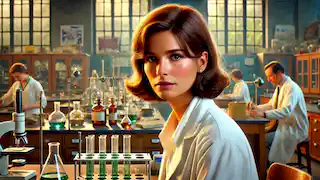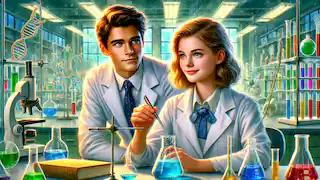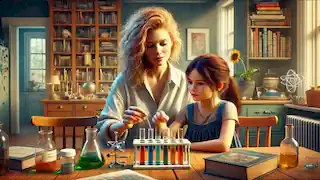Lessons in Chemistry
Reading time: 8 min

About this story: Lessons in Chemistry is a Realistic Fiction from United States set in the 20th Century This Humorous tale explores themes of Perseverance and is suitable for Adults. It offers Educational insights. A chemist defies 1960s gender norms to spark a quiet revolution.
In the early 1960s, society did not expect much from women beyond marriage, motherhood, and maintaining the home. But Elizabeth Zott, the protagonist of "Lessons in Chemistry," is anything but conventional. Intelligent, independent, and unwilling to conform to the norms of the day, Elizabeth’s life is a testament to the struggles of a woman who dares to challenge society's gender norms and make her own path. Bonnie Garmus' novel tells the engaging, often humorous, and poignant story of a woman navigating the sexist world of the 1960s as a chemist and television personality. Through Elizabeth's journey, the novel touches on themes of equality, resilience, and self-determination, all while infused with a wit that keeps the reader invested from start to finish.
The Lab
Elizabeth Zott was not someone who fit into a neat box, and that was clear from the very first time she set foot in the Hastings Research Institute, a male-dominated bastion of scientific research. As one of the few women in the lab, Elizabeth was treated as a subordinate by most of her colleagues. Her brilliance and scientific acumen were often dismissed simply because she was a woman.
Elizabeth had dreams of scientific discovery, but her reality was that her male counterparts took credit for her work. Her boss, Dr. Donatti, constantly belittled her, ensuring she knew her place was not in the realm of discovery but as an assistant at best. Yet, Elizabeth was not one to give up. She was determined to prove herself and make her mark, regardless of the obstacles thrown her way. It was in the lab where she met Calvin Evans, the Nobel-prize-nominated scientist who would change her life forever.
Calvin was unlike anyone else Elizabeth had encountered. His respect for her intelligence and dedication was immediate, and their shared passion for chemistry soon blossomed into a deep and abiding love. They worked side by side, their partnership fueled by mutual admiration and a hunger for discovery.

Love and Loss
Calvin and Elizabeth's relationship was unconventional from the start, much like the individuals themselves. They lived together unmarried, a scandalous decision in 1960s America, and Calvin's proposal was more about recognizing their equality than anything resembling a traditional romantic gesture. However, tragedy struck when Calvin died unexpectedly in a tragic accident, leaving Elizabeth heartbroken and alone, just as she was about to reveal to him that she was pregnant.
In the aftermath of Calvin's death, Elizabeth faced a world that was even less accommodating. She was a single mother, something deeply frowned upon at the time, and she found herself ostracized and further marginalized in her professional and personal life. Nonetheless, Elizabeth refused to give up. She continued to pursue her scientific ambitions while raising her daughter, Madeline.
The birth of Madeline brought its own set of challenges, but Elizabeth’s love for her daughter became a central driving force in her life. She made an unconventional decision to raise her daughter based on the scientific method, teaching her logic and reasoning from a very young age.
Elizabeth’s life with Madeline was marked by struggles, but it also included moments of joy. Despite the societal expectations, Elizabeth taught her daughter to question everything, to never accept the limitations imposed on her, and to pursue knowledge as the key to understanding and shaping the world.
Supper at Six
A twist of fate led Elizabeth to an unexpected career as the host of a cooking show called *Supper at Six*. Elizabeth had not sought out this job—she had been approached by a television producer who saw potential in her no-nonsense, direct approach to cooking. Her aim, however, was not simply to teach women to prepare meals but to use the platform as a means to inspire them to think critically about the world around them.
Elizabeth’s kitchen was unlike any other seen on television at the time. She approached cooking as a science, breaking down the chemical reactions behind each recipe and teaching her viewers more than just the basics of meal preparation. She sought to empower women by encouraging them to see themselves as intelligent and capable individuals, pushing them to question the societal roles they had been forced into.
*“Cooking is chemistry,”* Elizabeth would often say during her show, and through her unconventional style, she quickly gained a following. Her message, however, did not sit well with everyone. The network tried to control her, attempting to water down her content and make her conform to the image of the traditional housewife. But Elizabeth refused. She remained true to herself and her beliefs, much to the chagrin of the network executives who underestimated her influence.

The Resistance
Elizabeth’s success as a television personality did not come without its battles. Her refusal to conform to the submissive, accommodating image of a woman meant that she faced constant backlash, both from the public and from the media. Critics called her difficult, and rumors swirled about her personal life, particularly about her past relationship with Calvin and her status as a single mother.
Despite the challenges, Elizabeth’s message resonated with a significant portion of her audience—women who were tired of being told they were only valuable as wives and mothers. These women, inspired by Elizabeth's example, began to push back against the constraints of their own lives.
At the same time, Elizabeth faced struggles within her personal circle. Her daughter, Madeline, began to grow older and more aware of the social pressures surrounding her unconventional family. Madeline had always known her mother was different, but as she entered school, she faced teasing from her classmates and questions she didn't know how to answer. The mother-daughter bond was tested as Elizabeth tried to balance her public life with the private struggles of raising a child in a society that viewed their family with suspicion.
Yet, even in the face of all this, Elizabeth remained true to herself. Her love for science and her determination to make a difference kept her going. She continued her research, worked on her television show, and did her best to raise her daughter to be strong and independent. The challenges never ceased, but Elizabeth’s resilience never faltered.
Triumph and Legacy
As Elizabeth’s career on television grew, so did the influence of her message. More women began to see that they could have lives outside the home, that they could be more than just housewives or mothers. Elizabeth became an icon, even though she had never set out to be one.
Her chemistry lessons, cleverly disguised as cooking demonstrations, sparked a quiet revolution. Women began writing to her, thanking her for inspiring them to return to school, pursue careers, and challenge the status quo. While Elizabeth remained modest about her impact, it was clear to everyone around her that she had changed lives.
As Madeline grew, she began to understand more about her mother's journey and the sacrifices Elizabeth had made. Their relationship evolved, and the love between them only deepened as they both learned from each other. Madeline, a product of her mother's scientific mind and rebellious spirit, started to carve her own path in the world, always remembering the lessons her mother had taught her about standing up for herself and never settling for less.
Elizabeth’s journey was not without its losses and hardships, but through it all, she never lost sight of what truly mattered: her love for science, her desire to make a difference, and her commitment to raising her daughter in a way that would allow her to achieve anything she set her mind to.

Epilogue: Beyond the Kitchen
Years after Elizabeth's show ended, her influence could still be felt. Women had entered the workforce in greater numbers, and the rigid gender roles of the 1960s had begun to erode. Elizabeth had played a part in that change, even though she never intended to be a revolutionary figure. Her commitment to science and equality had left a lasting legacy, one that transcended her time in the spotlight.
In her later years, Elizabeth returned to scientific research full-time, working quietly on her projects, but her legacy as a television star and feminist icon endured. The values she instilled in her daughter and the countless women who watched her show lived on, shaping future generations of women who dared to dream of lives beyond the confines of their kitchens.
Through Elizabeth Zott’s journey, "Lessons in Chemistry" presents a timeless story of resilience, intelligence, and the importance of self-belief in the face of societal expectations. It reminds us that change is possible, even when it seems like the world is set against us.



















